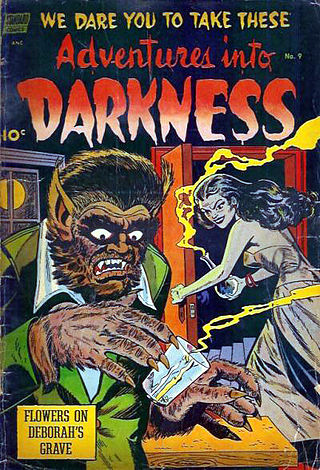
Werewolf fiction denotes the portrayal of werewolves and other shapeshifting therianthropes, in the media of literature, drama, film, games and music. Werewolf literature includes folklore, legend, saga, fairy tales, Gothic and horror fiction, fantasy fiction and poetry. Such stories may be supernatural, symbolic or allegorical. A classic cinematic example of the theme is The Wolf Man (1941) which in later films joins with the Frankenstein Monster and Count Dracula as one of the three famous icons of modern day horror. However, werewolf fiction is an exceptionally diverse genre, with ancient folkloric roots and manifold modern re-interpretations.
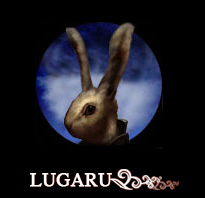
Lugaru: The Rabbit's Foot is the first commercial video game created by indie developer Wolfire Games. It is a cross-platform, open-source 3D action game. The player character is an anthropomorphic rabbit utilizing a wide variety of combat techniques to battle wolves and hostile rabbits. The name Lugaru is a phonetic spelling of "loup-garou", which is French for werewolf. It was well reviewed and was fairly well received among the shareware community, especially among Mac users. A sequel, Overgrowth, was released in 2017.

Suikoden is a role-playing video game published by Konami. It is the first installment of the Suikoden series. Developed by Konami Computer Entertainment Tokyo, it was released initially in 1995 for the PlayStation in Japan. A North American release followed one year later, and a mainland European release came the following April. The game was also released for Windows and Sega Saturn in 1998, but only in Japan.

Final Fantasy XV is an action role-playing game developed and published by Square Enix. The fifteenth main installment of the Final Fantasy series, it was released for the PlayStation 4 and Xbox One in 2016, Windows in 2018, and as a launch title for Stadia in 2019. The game features an open world environment and action-based battle system, incorporating quick-switching weapons, elemental magic, and other features such as vehicle travel and camping. The base campaign was later expanded with downloadable content (DLC), adding further gameplay options such as additional playable characters and multiplayer.
Celso Riva is an Italian independent video game designer of several critically acclaimed games, including The Goalkeeper, Universal Boxing Manager, Magic Stones, the Heileen and Vera Blanc series, Bionic Heart, and the Loren the Amazon Princess.

The Path is a psychological horror art game developed by Tale of Tales originally released for the Microsoft Windows operating system on March 18, 2009, in English and Dutch, and later ported to Mac OS X by TransGaming Technologies.
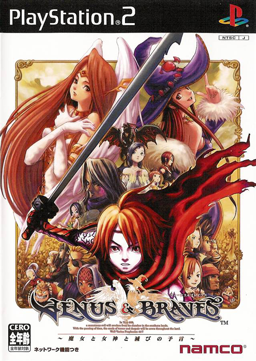
Venus & Braves: Majo to Megami to Horobi no Yogen is a tactical role-playing game developed by Namco for the PlayStation 2. A pseudo-sequel to the 2-dimensional RPG Seven: Cavalry Troop of Molmorth, it takes place in the same fantasy world. Venus & Braves includes both a single player mode and multiplayer PlayStation Network battles. The game's plot revolves around an immortal warrior named Blood Boal who is sent by a goddess to save the world from destruction in a hundred years' time. The story itself takes place during the ensuing century and beyond. The game was released exclusively in Japan on February 13, 2003.

Magical Diary is a visual novel video game series that takes at a magical school and includes romance elements. The series is developed and published by Hanako Games.

Planet Stronghold is a visual novel, sci-fi role-playing video game with a turn-based combat system, developed and published by Italian studio Winter Wolves on February 28, 2011 for the Android, iOS, Linux, macOS, and Microsoft Windows platforms.

Injustice: Gods Among Us is a 2013 fighting video game. It is the first installment in the Injustice franchise based upon the fictional universe of DC Comics.

Loren The Amazon Princess is a Fantasy RPG visual novel by Italian independent studio Winter Wolves. The game was released on April 30, 2012. The game was released for Linux, Mac OS X, Microsoft Windows, Android, and iOS. The expansion The Castle Of N'mar was released on September 28, 2012. A spin-off titled Tales of Aravorn: Seasons of the Wolf was released on November 15, 2014

Rose Guns Days is a four-part Japanese dōjin visual novel series produced by 07th Expansion and playable on Windows PCs. The first game in the series, Season 1, was released on August 11, 2012, and the fourth game, Last Season, was released on December 31, 2013. There have been six manga adaptations based on Rose Guns Days published by Kodansha and Square Enix.

Tales of Xillia is an action role-playing game released exclusively for the PlayStation 3. It is the thirteenth main installment of the Tales series and is developed by Namco Tales Studio with Namco Bandai Games as the publisher. The game was released in Japan on September 7, 2011, and was localized in North America and PAL region in August 2013. The game takes place in a fictional world called Rieze Maxia where humans and ethereal spirits live in harmony. It follows Jude Mathis and Milla Maxwell who elude government officials after sabotaging a weapon of mass destruction known as the Lance of Kresnik. The plot's central theme is Yuruginaki shinnen no RPG.

Tales of Xillia 2 is an action role-playing game for the PlayStation 3 released on November 1, 2012, in Japan. It is the fourteenth core product in the Tales series and was developed and published by Bandai Namco Games. The game was localized for North America and Europe in August 2014.
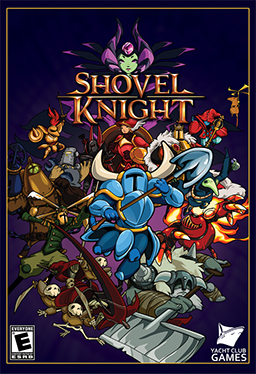
Shovel Knight is a platform video game developed and published by Yacht Club Games. Development was crowdfunded and the game was released for Nintendo 3DS, Wii U, and Windows in June 2014. It was ported to OS X and Linux in September 2014, PlayStation 3, PlayStation 4, PlayStation Vita, and Xbox One in April 2015, Amazon Fire TV in September 2015, and Nintendo Switch in March 2017. Shovel Knight is inspired by gameplay and graphics of platformer games developed for the Nintendo Entertainment System.

Tales of Zestiria is an action role-playing game. It is the fifteenth main entry in the Tales series, developed by Bandai Namco Studios and published by Bandai Namco Entertainment. It was released in January 2015 in Japan on the PlayStation 3. For Western release in October of the same year, it was also ported to PlayStation 4 and Windows via Steam. The PS4 version was released in Japan in July 2016. As with previous entries in the Tales series, the game uses a variation of the action-based Linear Motion Battle System, with additional elements including a navigable open world, and the ability for certain characters to fuse into a single entity in battle to deliver powerful attacks.

Darkest Dungeon is a roguelike role-playing video game developed and published by Red Hook Studios. The game was first released for Microsoft Windows and OS X in January 2016, which followed a year-long early access development period. Later that year, it was released for PlayStation 4, PlayStation Vita, and Linux, with a port for iOS being released in 2017, and ports for Nintendo Switch and Xbox One being released by 2018.
Warhammer 40,000: Space Wolf is a free-to-play, squad-based strategy card game, developed and published by HeroCraft. The game is licensed by Games Workshop. The game was released on October 28, 2014, on iOS and on Android on July 16, 2015, and on Microsoft Windows via Steam on February 17, 2017. The PlayStation 4 version was released in March 2019 in North America and Europe, and on Nintendo Switch on January 23, 2020. It was later released for Xbox One on June 30, 2021.
Princess Connect! Re:Dive is a Japanese role-playing video game developed by Cygames. It was released in Japan on February 15, 2018 for Android and iOS, and on May 22, 2018 for Microsoft Windows via DMM Games. Mobile version would later be released in other regions.
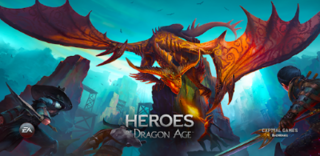
Heroes of Dragon Age is a freemium mobile tactical role-playing game developed by Capital Games and published by Electronic Arts. It is a spin-off title utilizing collectibles based on characters and lore from the Dragon Age fantasy series. The game received a soft launch in select countries during October 2013 for Android devices, and was released on December 5, 2013 for Android and iOS platforms.

















